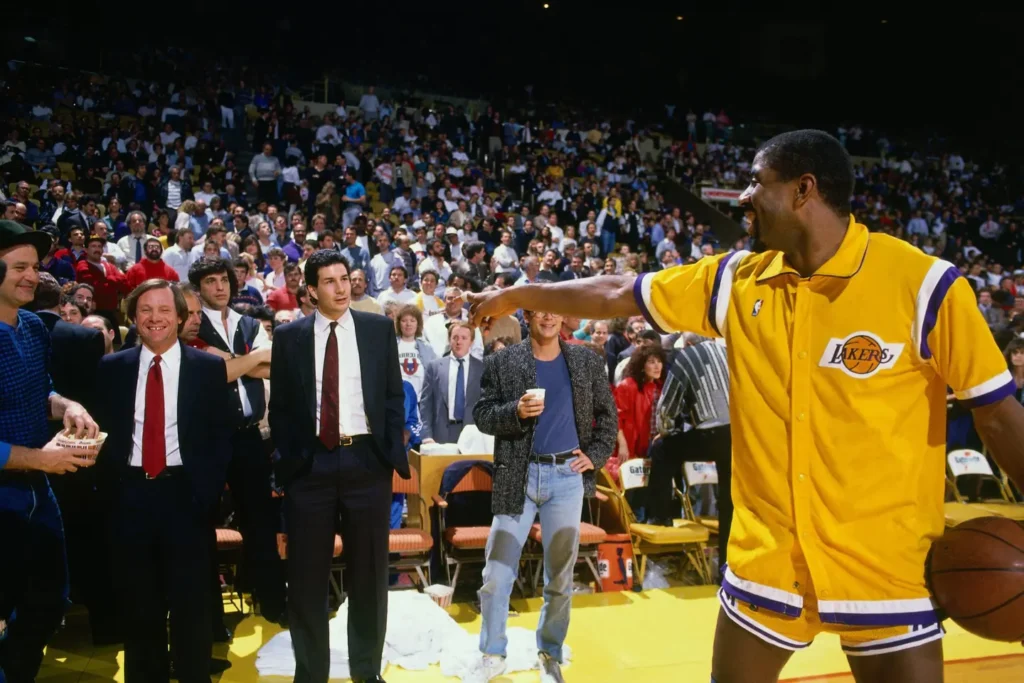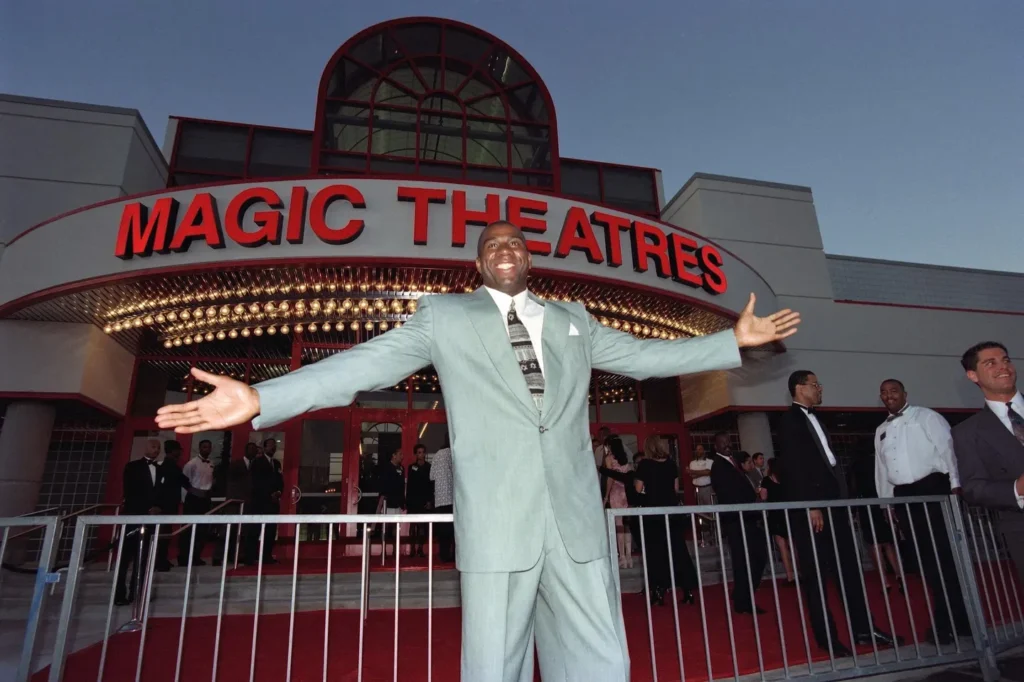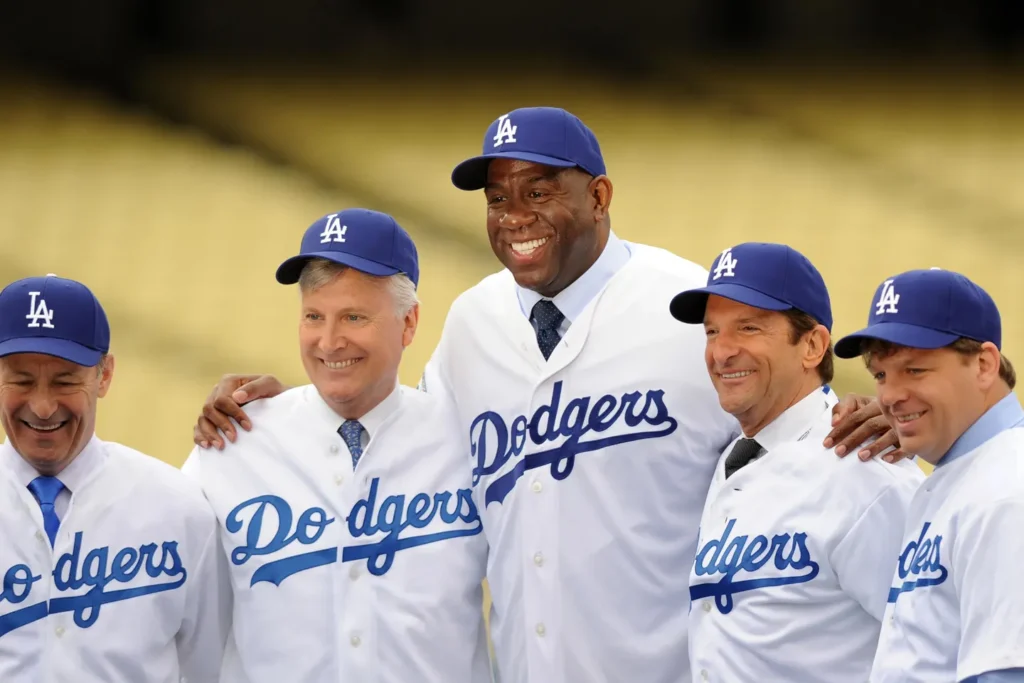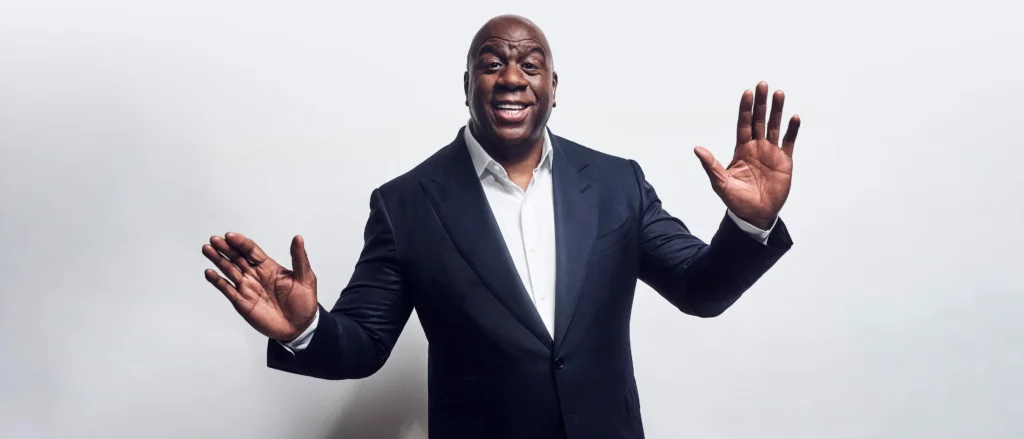In the heyday of the Showtime-era Lakers during the 1980s, Earvin Johnson faced skepticism about athletes venturing into the business world. Undeterred, at the age of 31, Johnson expressed his ambitious goal of reaching the “$100-$200 million range” in a 1990 Sports Illustrated interview, sparking curiosity about his plans for such wealth. Johnson envisioned investing in a franchise, not necessarily the Lakers or even an NBA team, expressing his passion for sports and big business.
Fast forward to today, and Johnson has minority ownership in diverse sports entities such as the NFL’s Washington Commanders, MLB’s Los Angeles Dodgers, the WNBA’s Los Angeles Sparks, and MLS’s LAFC. Magic Johnson Enterprises extends its influence across various sectors, including movie theaters, fast-food franchises, real estate, and healthcare. However, the crown jewel of Johnson’s business empire is EquiTrust, a life insurance provider based in Des Moines, Iowa. His controlling stake in EquiTrust comprises the majority of his estimated personal net worth, now valued at $1.2 billion by Forbes.

O-Time: Johnson jokes with agent Michael Ovitz (second from left) before a Lakers game in 1988. Ovitz eventually became a business mentor.ANDREW D. BERNSTEIN/GETTY IMAGES
At 64, Magic Johnson joins the exclusive club of athlete billionaires, a distinction shared with Michael Jordan, Tiger Woods, and LeBron James. Remarkably, Johnson achieved this without the colossal earnings from his playing days, totaling around $40 million (approximately $110 million adjusted for inflation) during his tenure with the Lakers from 1979 to 1991, and a brief comeback in 1996. In stark contrast, LeBron James has amassed a staggering $479 million and counting from his playing career.
To navigate the vast gap, Johnson applied the teamwork and winning strategies that defined his basketball career. He leveraged joint ventures and partnerships, utilizing his charismatic smile and business acumen to build enduring relationships in the corporate realm. Mandalay Entertainment CEO Peter Guber, a longtime collaborator, acknowledges Johnson’s innate talent, describing it as a unique quality that, if understood, could be transformative for others.
Johnson’s entry into the business arena was facilitated by mentors like Peter Guber and Hollywood super-agent Michael Ovitz. Despite initial reluctance from Ovitz, who doubted the earning potential of athletes, Johnson’s charm and determination led to a business boot camp and fruitful collaborations. Ovitz, impressed by Johnson’s prowess, even renegotiated his Lakers contract and facilitated valuable business connections without taking a commission.
One notable success came in 1990 when Johnson, under Ovitz’s guidance, secured a 33% stake in a $60 million deal to acquire a PepsiCo bottling plant near Washington, D.C. His ability to charm executives and strike advantageous deals became a recurring theme. Johnson’s partnership with Guber in building a movie theater in a crime-ridden Los Angeles neighborhood showcased his community-centric approach, ultimately yielding significant profits.
In another strategic move, Johnson persuaded Starbucks CEO Howard Schultz to explore the untapped spending power of Black America. This led to a 50/50 joint venture, resulting in over 100 Starbucks stores in Black neighborhoods across the country. Johnson’s skillful negotiation even involved using Starbucks as his personal bank, securing a loan for expansion.
Ken Lombard, president of Johnson Development Corporation, emphasizes the leverage gained in partnerships due to Johnson’s presence, turning obstacles into opportunities. Magic Johnson’s journey from the basketball court to the billionaire boardroom is a testament to his exceptional teamwork, business acuity, and ability to build lasting connections in the corporate world.

Showtime, The Sequel: In the 1990s, Johnson opened a chain of movie theaters in predominantly Black neighborhoods because he knew how to reach the audience.DAN GROSHONG/GETTY IMAGES
In addition to capitalizing on his celebrity, Johnson infused each of his deals with what he considered his expertise—connecting with Black consumers. For instance, he tailored his movie theaters by offering flavored sodas and additional hot dogs. Describing the strategy in 2000, he told the New York Times, “I told Loews, Black people are going to eat dinner at the movies. Those hot dogs are our dinner. Same with the drinks. Our soda sales were just okay. I said, Black people love flavored drinks because we were raised on Kool-Aid. So we put in punch and strawberry soda and orange, and the numbers went through the roof.”
Similarly, he replaced scones with sweet potato pie in his Starbucks shops, where he also installed picnic tables with chess boards and played R&B over the speakers. Despite being situated in lower-income neighborhoods, the average spend per customer at his Starbucks locations surpassed the national average.
Lombard emphasizes that the Starbucks deal was a game-changer for Johnson, earning him the respect of institutional investors who had initially turned him down. The California Public Employees Retirement System (CalPERS) invested $50 million in a real estate development venture he co-founded with San Francisco-based investment management firm MacFarlane Partners in 1996, targeting Black communities. Johnson and MacFarlane contributed just $1.5 million, generating revenue through asset management fees and exit incentives. Later, Johnson replicated the same concept in partnership with Canyon Capital, a Los Angeles-based hedge fund, establishing a $300 million fund in 2001, a $600 million real estate fund in 2005, and a $1 billion fund in 2008.
Earl Graves Jr., another professional athlete-turned-businessman who led Johnson’s initial deal with PepsiCo alongside his father, the founder of Black Enterprise magazine, comments on the unjust criticism faced by African American entrepreneurs involved in joint ventures. He underscores that when depositing money in a bank, the distinction between being the creator of the business or part of a joint venture is not considered.
Despite his business acumen, Johnson missed out on some of the most lucrative opportunities. In the now-infamous tale, Nike offered him an endorsement deal before the 1979 NBA draft, including royalties on shoe sales and a substantial amount of company stock—greater than the deal Michael Jordan would accept five years later. Johnson declined in favor of guaranteed money from Converse, resulting in a substantial financial missed opportunity.
In 1994, Lakers owner Jerry Buss presented Johnson with an opportunity to purchase a 4.5% stake in the team for $10 million, which Johnson eventually sold in 2010 to healthcare billionaire Patrick Soon Shiong just before NBA team values skyrocketed. According to Forbes estimates, in 2010, Johnson’s stake in the Lakers would have been worth $29 million. If he had retained the stake, it would be valued at over $265 million today.

Whole New Ballgame: In 2012, Johnson became part of the new ownership group of the Los Angeles Dodgers, including (from left) Stan Kasten, Mark Walter, Peter Guber, and Todd Boehly.CHRIS WILLIAMS/GETTY IMAGES
In the same year, Johnson had a meeting in Santa Monica with Guber and Joe Lacob, the new owners of the Golden State Warriors. Guber recalls, “He was the first person we met with after we acquired the team about him potentially being involved with us.” Citing his strong ties with the Lakers, Johnson ultimately chose not to invest. Forbes currently values the Warriors at $7.7 billion, more than 17 times the team’s purchase price in 2010.
Nevertheless, Johnson has been adept at entering, exiting, and expanding his investments for over 30 years. The proceeds from his Lakers and Starbucks sales in 2010 gave him the capacity to write a $50 million check to join the Dodgers ownership group in 2012, alongside Guber and Guggenheim Partners. His 2.3% stake has more than doubled in value, now estimated at $110 million. In the same year Johnson invested in the Dodgers, he made a small investment in Simply Healthcare, coinciding with its launch of a Medicaid plan for people with HIV and AIDS. When the company sold for $1 billion in 2015, Johnson used the proceeds to acquire a 60% stake in EquiTrust Life Insurance from Guggenheim.
EquiTrust is currently the largest asset in the Magic Johnson Enterprises portfolio, representing how far he has progressed as a businessman. Since assuming control, Johnson has increased the company’s total assets from $16 billion to $26 billion, with annual revenues around $2.6 billion. Andrea Caruso, chief operating officer of life insurance data provider MIB Solutions, notes that while life insurance requires an investment, it is not an easy one due to the complexity of navigating ever-changing regulatory guidelines.
“Life insurance definitely does require an investment. Would I say it’s an easy investment? No,” Caruso says. “But it does provide an opportunity to provide that piece of mind to people.”
Owning a life insurance company may hold a deeper meaning for a man diagnosed with HIV in 1991, but according to Ovitz, “he was always agnostic about what the business was as long as it fit the parameters of what a good business should be.”
Presently, Johnson has investments ranging from NFTs to CBD, and his infrastructure joint venture is contracted to renovate Terminal 1 at John F. Kennedy International Airport in New York and Los Angeles International Airport’s cargo facility.
Remarkably, Johnson is now regarded by many as much a businessman as an athlete, setting an example of how future generations can bridge that divide. Russell Westbrook is seen following the Johnson playbook with his investments. In the documentary series They Call Me Magic, fellow Basketball Hall of Famers Dwyane Wade, Charles Barkley, and Shaquille O’Neal cite Johnson as their primary business inspiration. As Shaq puts it, “We all owe Magic.”

